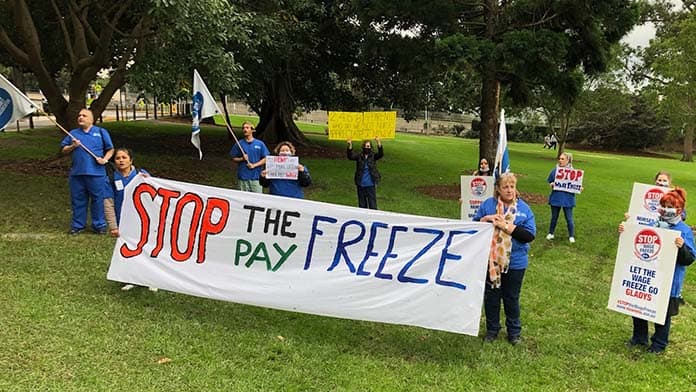Damien Davis-Frank works as a nurse in the emergency department at St Vincent’s hospital in Sydney. He talked to Solidarity about working in the medical system during the pandemic and what nurses think about the NSW government’s decision to scrap their 2.5 per cent pay rise this year.
What has it been like working in the hospital system during the COVID-19 pandemic?
When we first started to see the outbreak in China and then spreading across Europe, some of the early stories to come out of Italy, where the health system was just over-run, really brought home how serious the situation was, when you heard about all the young workers that were dying.
There was a lot of preparation in hospitals and a lot of anxiety. We had to do a lot of education for staff and change a lot of our processes in the emergency department.
The numbers never really got to that same level as overseas in NSW which was relieving but also created anxiety when we were just waiting to be hit.
It’s changed the way we see patients on a daily basis. COVID has been a situation where you’ve got to be on high alert the whole time, and having to maintain that vigilance without burning people out has been really hard.
In our emergency department, at St Vincent’s in Darlinghurst, we have a red zone and a green zone. Some staff each day have to work in the red zone, where anyone with any flu-like symptoms that could potentially be a COVID patient goes.
In that area you’ve got to be head-to-toe clad in PPE—full length gowns, gloves, masks, visors and goggles. It’s a long shift if you’re working eight to ten hours head to toe in this equipment.
Knowing that you’re going to be spending a day in the red zone is tough, you sweat, your glasses are fogging up, you’re constantly hot and irritated, and working with people who could expose you to COVID-19.
We’ve had to relearn a lot of the basic things we used to do.
For instance the way we intubate or put tubes down people’s throats has completely changed to minimise the risk of exposure to the health workers involved.
Have you had COVID cases at the hospital?
The most at one time we have had was two patients intubated in ICU going back to June. In the main peak of the disease in NSW we would have a couple in our department at any one time. We were very lucky that we didn’t reach the tipping point where we’d have to make bigger changes in how we ran the hospital.
Have there been any concerns about PPE?
There’s really limited transparency on how much PPE there actually is.
At our hospital we get a weekly update from the executives, and they say that the stock level is good. Hearing that is relieving, but there have been times when we have run out of certain masks and equipment, or masks have been found to be not appropriate, where a couple of weeks down the track they are pulled out of use because they’re not sufficient to protect people.
We’re been lucky in NSW that our PPE stocks haven’t been put to the test.
There are also concerns at lots of hospitals that everyone should be fit tested for masks, so that the masks are the right size for them. That hasn’t happened at our hospital which means that if you’re wearing equipment you’re not really sure if it’s the right size for you or not.
We’re waiting for that to be rolled around to our hospital but it’s been a long time in coming.
What do you think of the NSW government’s decision to effectively cut wages by withholding nurses’ 2.5 per cent pay increase this year?
Lots of colleagues just felt so disrespected and de-valued.
There’s a real injustice in taking nurses’ salaries away when we’ve proven in this pandemic that what’s really essential is healthcare, schools and teachers, and essential workers like cleaning staff and people making food.
Nurses are wondering why governments can afford to give tax cuts to the ultra-rich and they don’t look after and protect the people who are working to make sure our society and our communities are kept safe.
It’s been a real slap in the face. In the health system we were on the front line, and looking after the community, because we care.
Having the government say, we don’t think you deserve your yearly pay-rise to keep up with inflation, just feels like your work is not valued.






